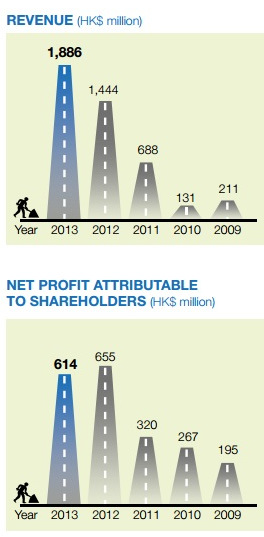 Kyith Ng Kyith NgThis article was recently published on Kyith Ng's blog and is republished with permission. China Merchants Holdings (Pacific) is one of the leading toll road operators in China and is the largest toll road company listed on the SGX-ST. Currently, the Company invests in and operates four toll roads in China. The four toll roads total approximately 367 kilometres and are located in Zhejiang province, Guangxi Zhuang Autonomous Region and Guizhou province in the PRC. China Merchants Huajian Highway Investment Co., Ltd (“Huajian”) is the holding company with an equity stake of 82.4% of the issued shares in the capital of the Company. Huajian, a wholly-owned subsidiary of China Merchants Group Limited, is one of the largest enterprises in China engaging in toll road investment and management. |
 Time & date: 10 am, 24 April 2014.
Time & date: 10 am, 24 April 2014.Venue: Pan Pacific Singapore
THE RECENT management restructuring is to aid CMHP's acquisition strategy going forward.
The parent company, Huajian, does not own substantial stakes but fragmented ones of 9 to 23% across 17 provinces. This will make acquisitions difficult.
What they intend to do is to swap the small stakes with other investors to create a substantial stake, enough to make an acquisition similar to Yongtaiwen Expressway (YTW).
One shareholder managed to 'force' it out of the new CEO Mr Luo Hui Lai’s mouth that they are looking to make a 1 billion acquisition this year.
Nothing was promised and it looks like this depends a lot on Mr Luo’s deal-making capabilities.
The Guihuang Situation
 Luo Hui Lai, executive chairman and CEO.
Luo Hui Lai, executive chairman and CEO. Photo: annual reportThe management clarified that Guiyang city is running out of space and Guihuang Highway will have to make way for urbanization.
There are compensation and lengthening of toll contributions, which was supposed to be reduced from the current 100% to 60% in 2015. The plan after development is completed is to run another road.
The management felt that the compensation should not create a material loss, and they are satisfied with it.
Much is up in the air, especially how the new roads are being developed, and whether there are attributable capital expenditure. It is still early days.
The convertible bond and RCPS (redeemable convertible preference shares)
 Every year, there's a discussion on whether the bond and preference shares will be converted, how it affects dividends, liquidity and forced privatization. Much can be known beforehand by reading the annual report.
Every year, there's a discussion on whether the bond and preference shares will be converted, how it affects dividends, liquidity and forced privatization. Much can be known beforehand by reading the annual report. The more AGMs I attend, the more I realize shareholders expect much spoon feeding from the management, or that they reprimand the management for something that isn’t justified.
We know that the convertible bond is not issued to the parent, or related parties, and likely, CMHP will want the bonds to be converted to improve liquidity and diversify its shareholders.
There is a shareholder who was unhappy with the RCPS and Bond --- he thinks the holders enjoy better benefits. The last I checked, both instruments have interest returns of less than 1.25% versus 7% for the dividends.
These are really low cost debts to shareholders and they should be enjoying these cheap financing instead of complaining.
Dividend Payable
What is unique about CMHP is that they have short term dividends payable that doesn’t go away. Mr Jiang Yan Fei (the previous CEO) explained that these are dividends payable to the parent, and because the parent does not need the money, it is left in the company.
We can think of this as loans to CMHP but they are interest-free. CMHP has enough cash to pay for it should they require.
Yongtaiwen’s cash flow plan after paying off debt
YTW’s debt payment plan should result in YTW being debt free after the next two years. Would the free cash flow be channeled back to the parent?
The management said because they don’t own 100% of the company, they have to discuss with the other shareholders (they have just had a meeting with other YTW shareholders not too long ago) on what they intend to do with the cash.
Once debt is paid off, tax payable will increase.
This is rather significant since YTW is used as a blue print for future acquisitions. This means CMHP cannot restructure the underlying debt to lower interest debt like how Ningbo Beilun Port Expressway does it.
Depreciation and debt payment cash flow freed up cannot be easily allocated by parent since they do not directly own it.
For a tabulation, and discussion, of how CMHP’s debt progress the past three years and likely next year, click here.
CMHP has HK$ 1.6 bil in cash, HK$300 mil from the sale of NZ property and a dividend payable of HK$340 mil.
Net debt is HK$2bil, of which $1 bil is convertible bonds.

